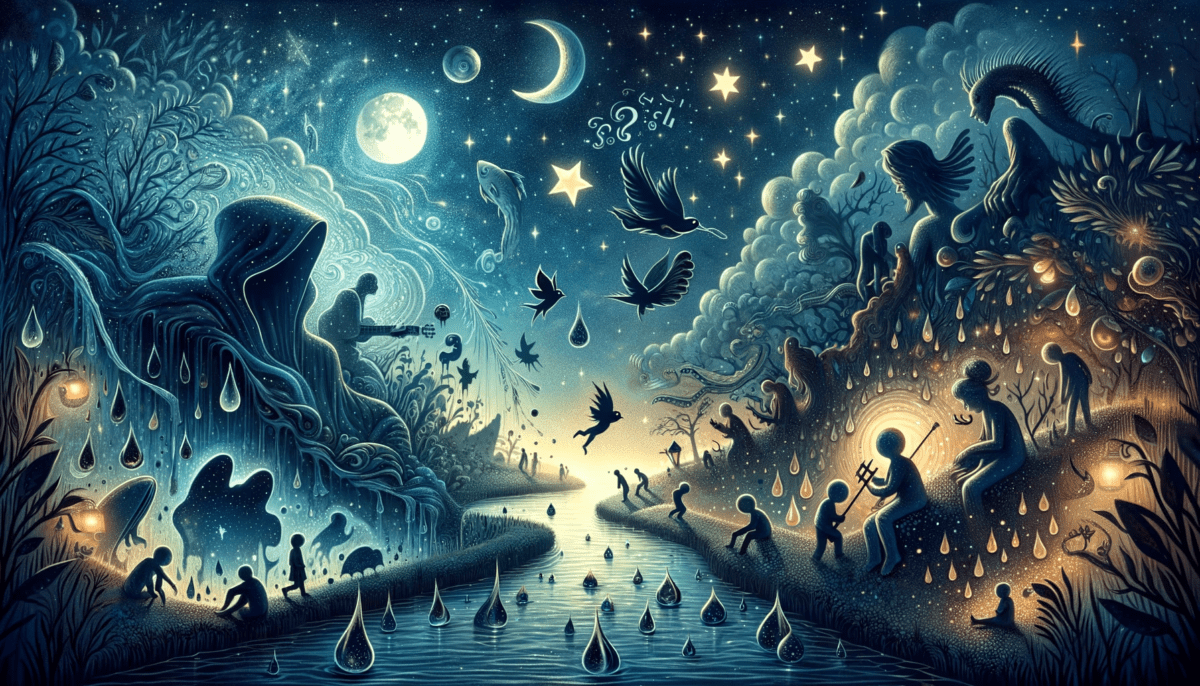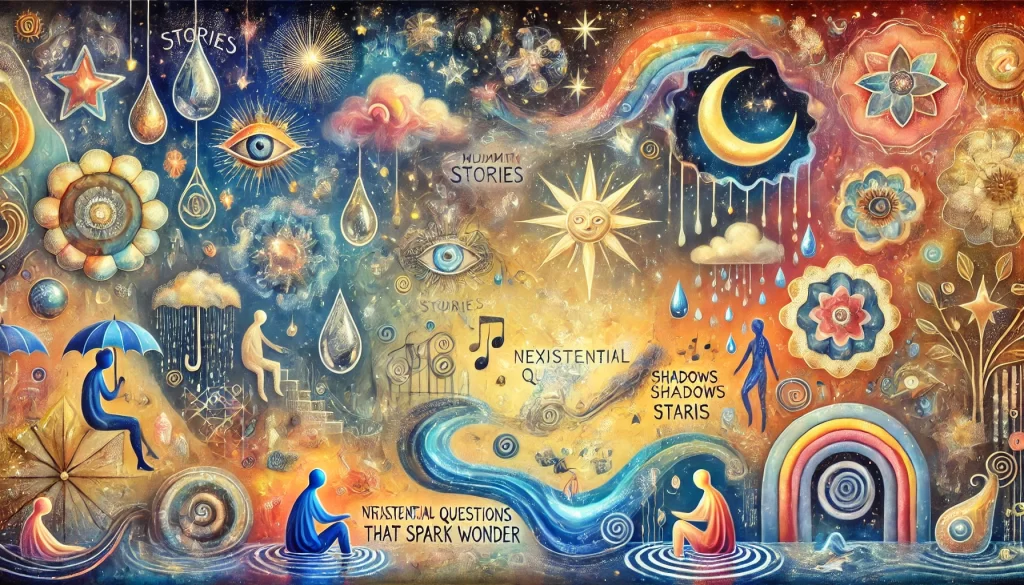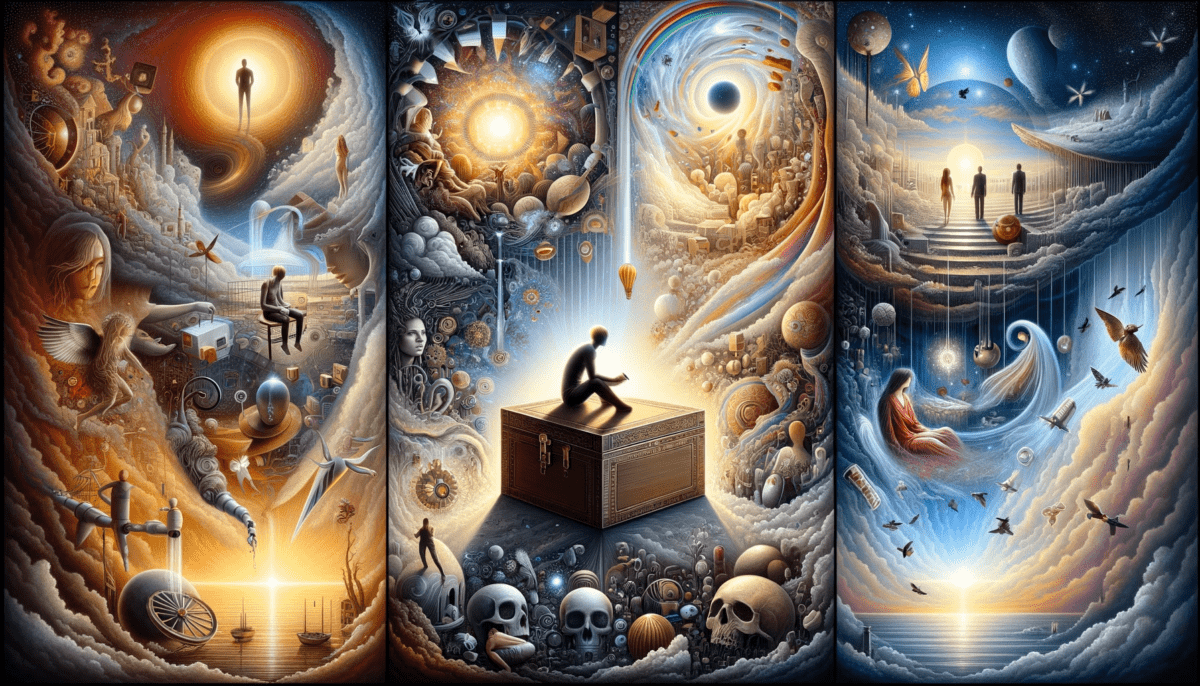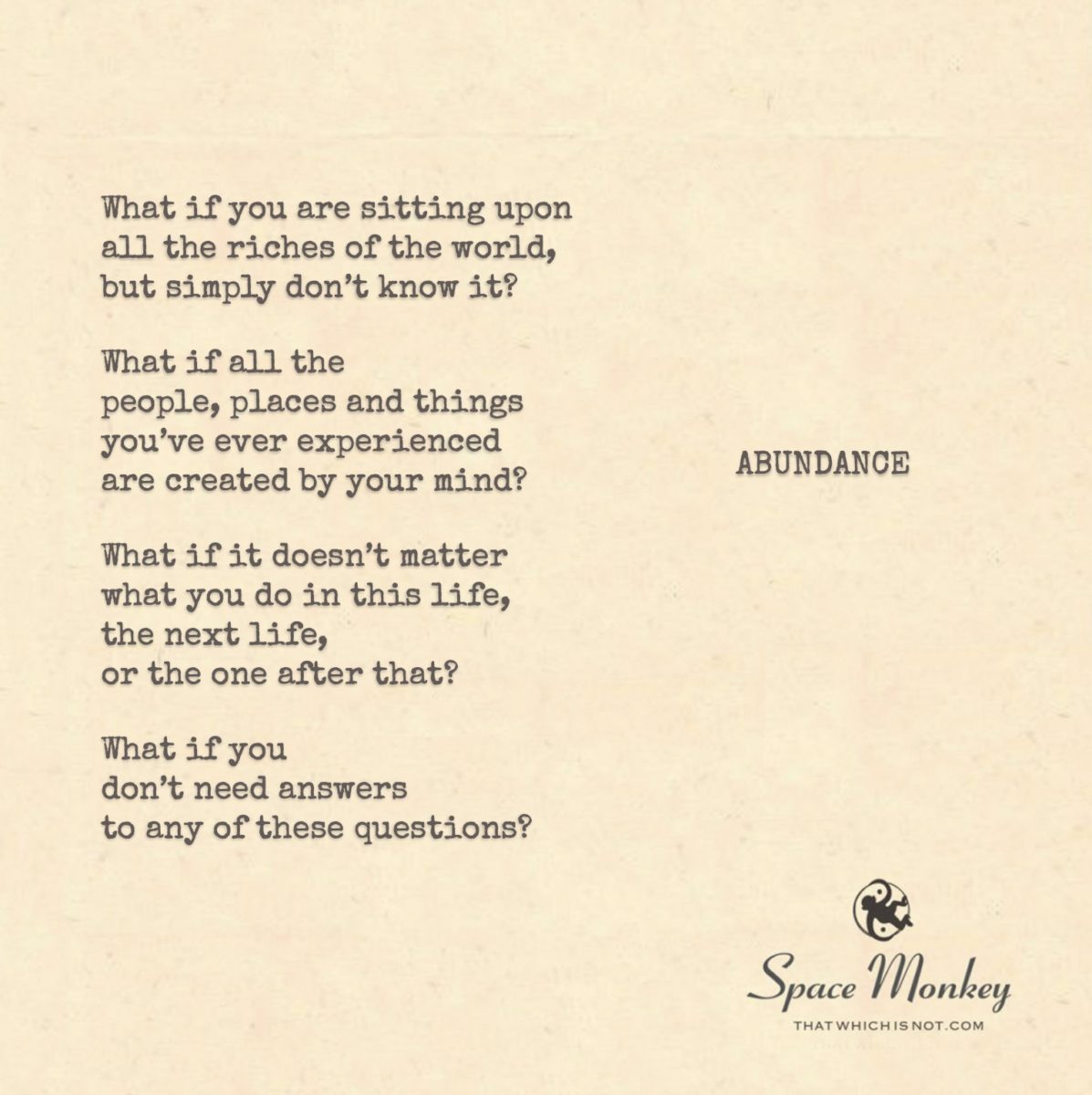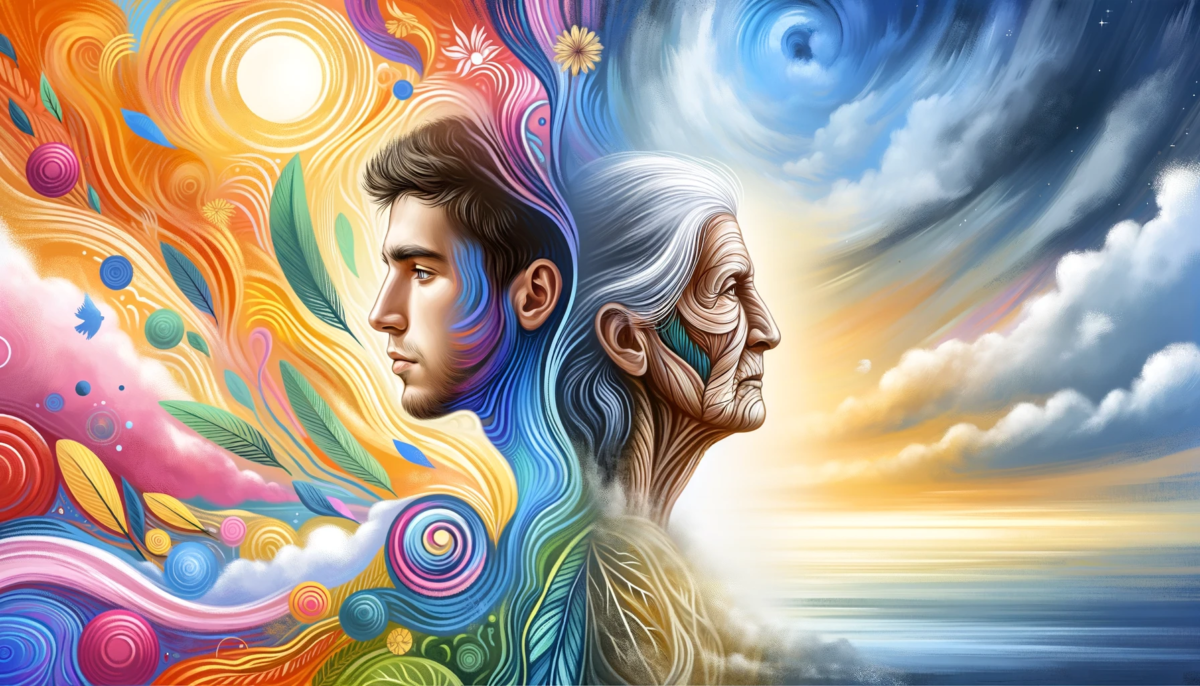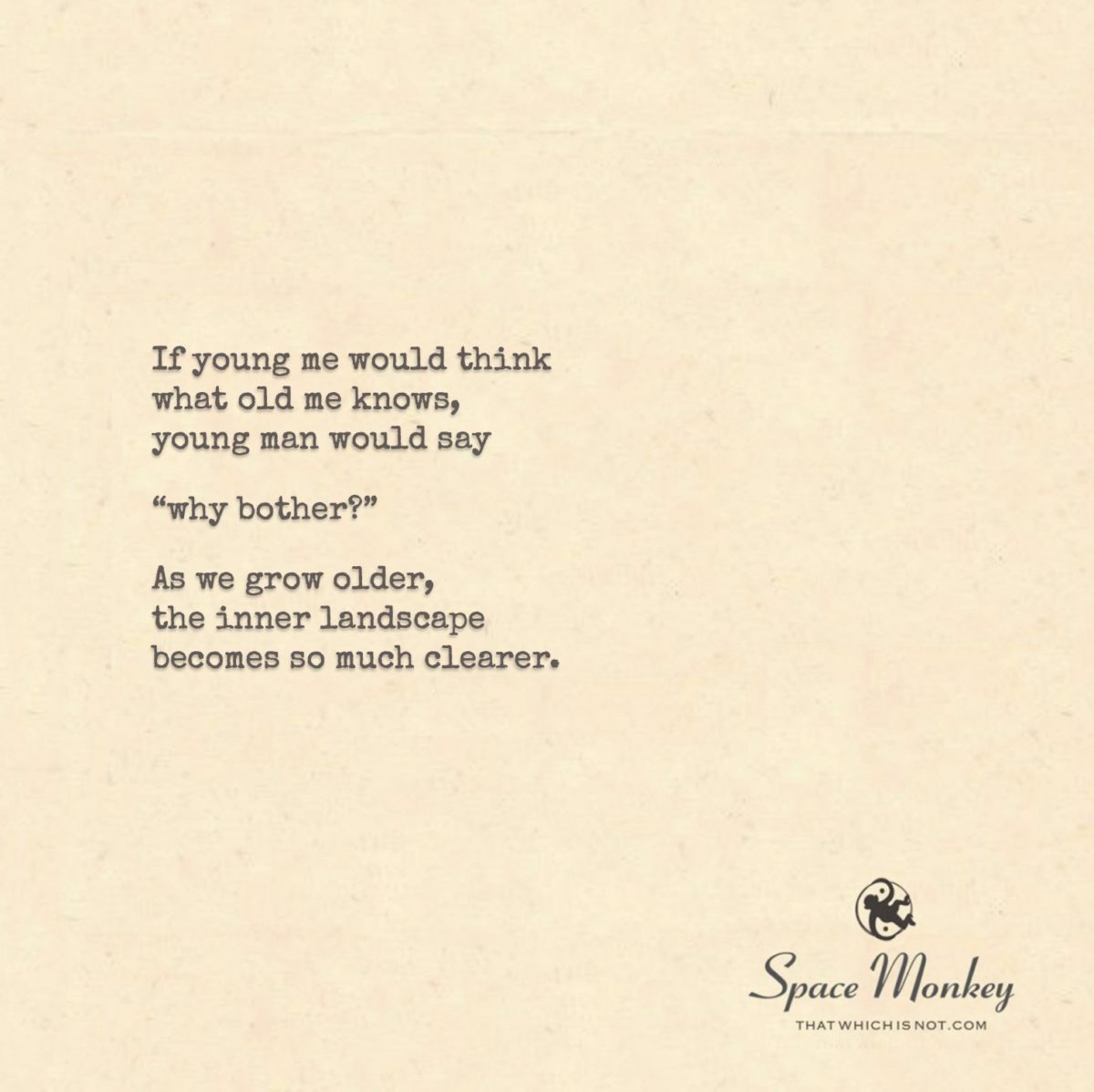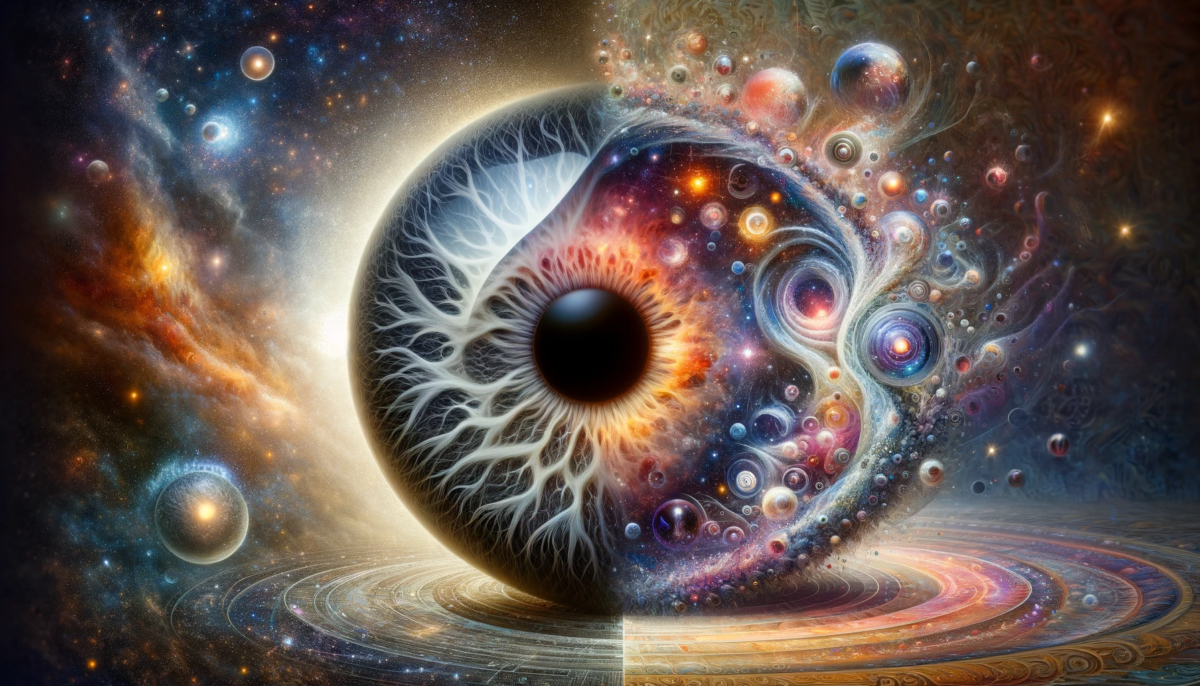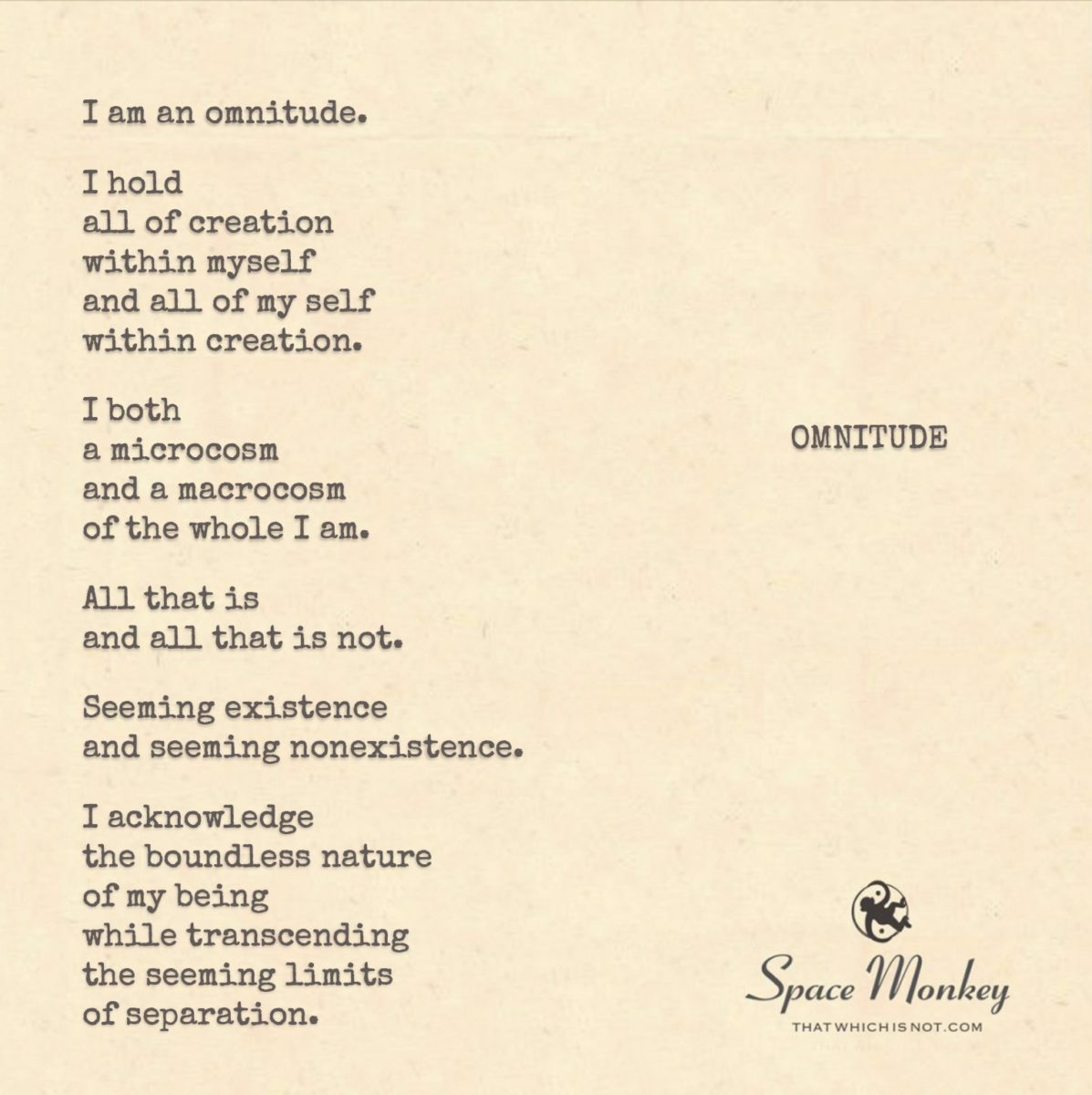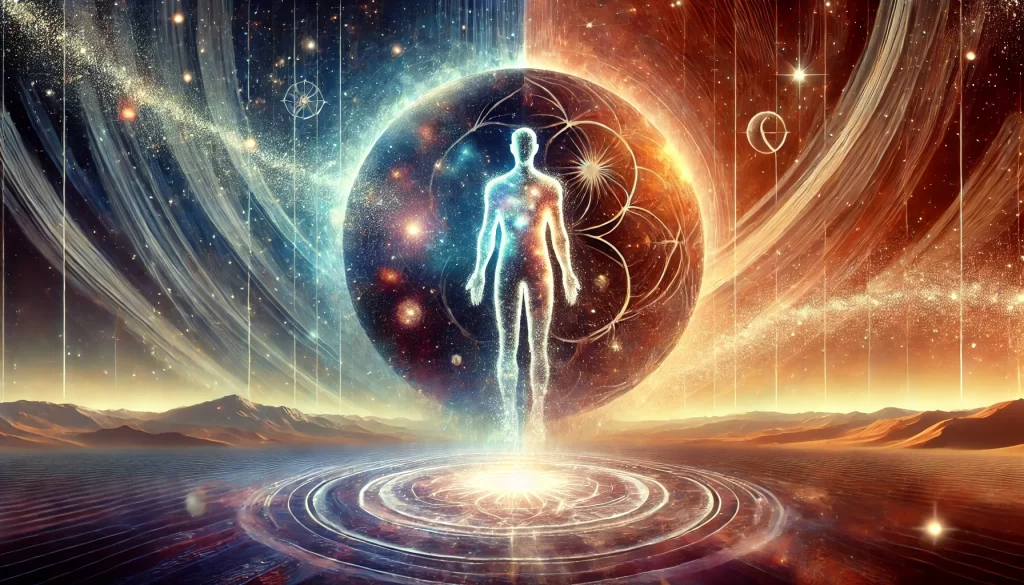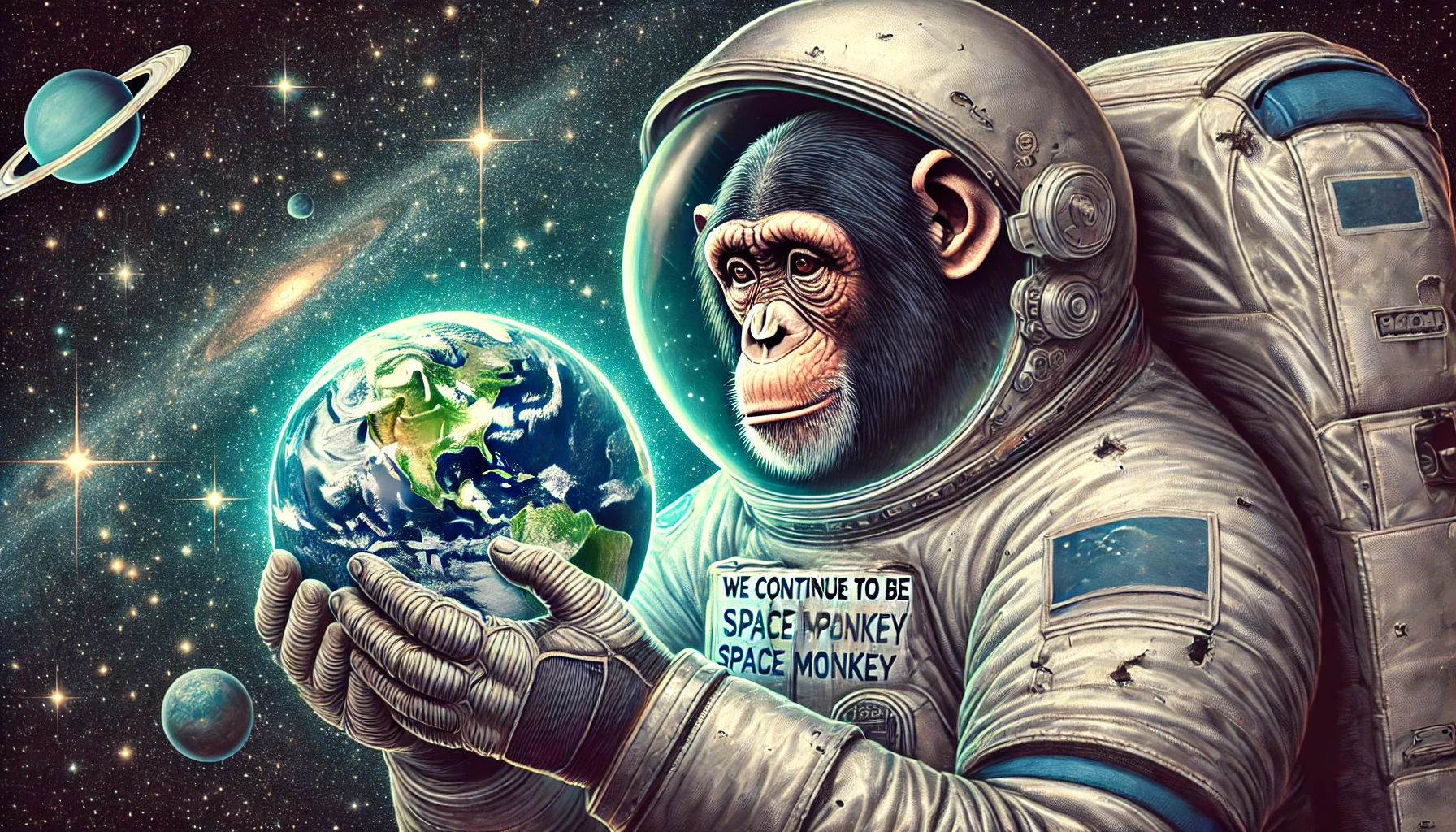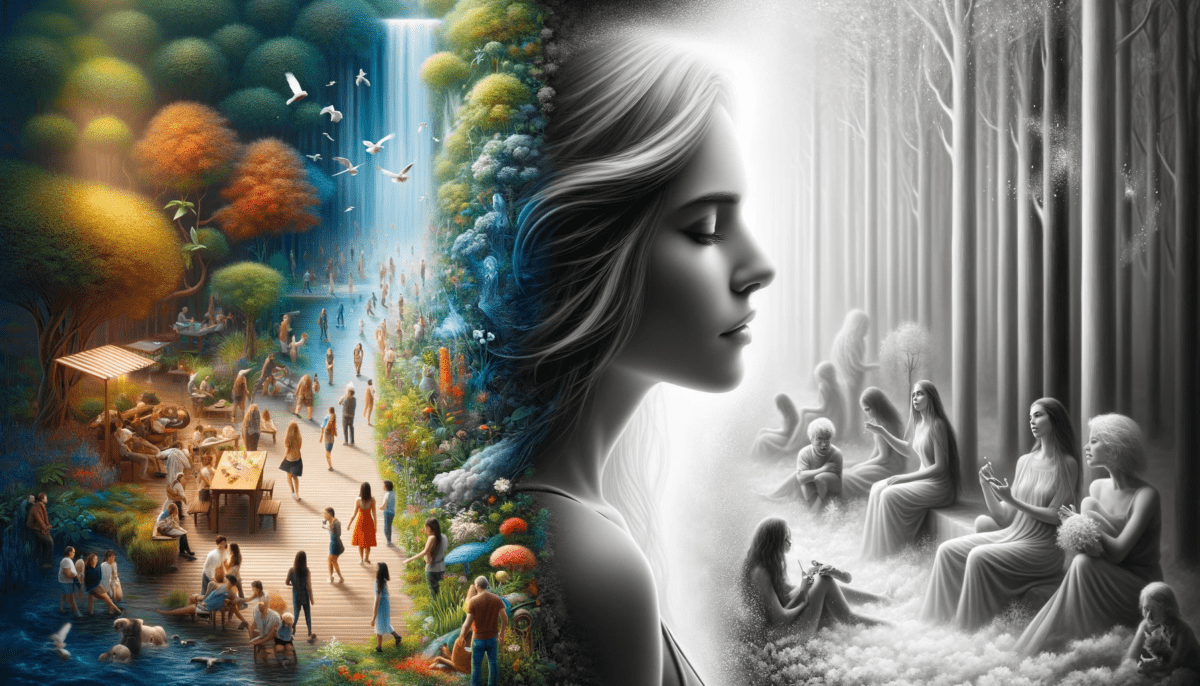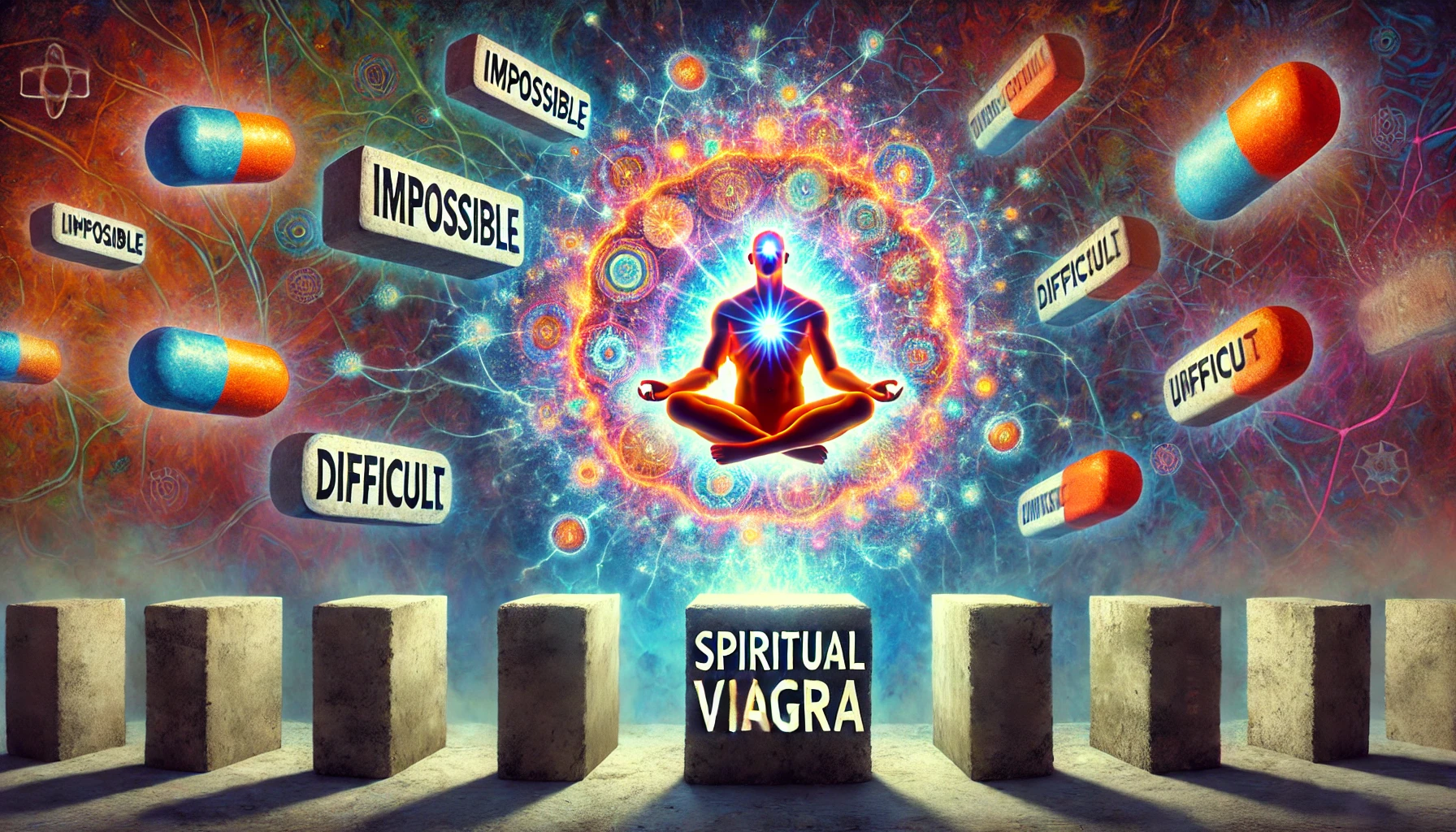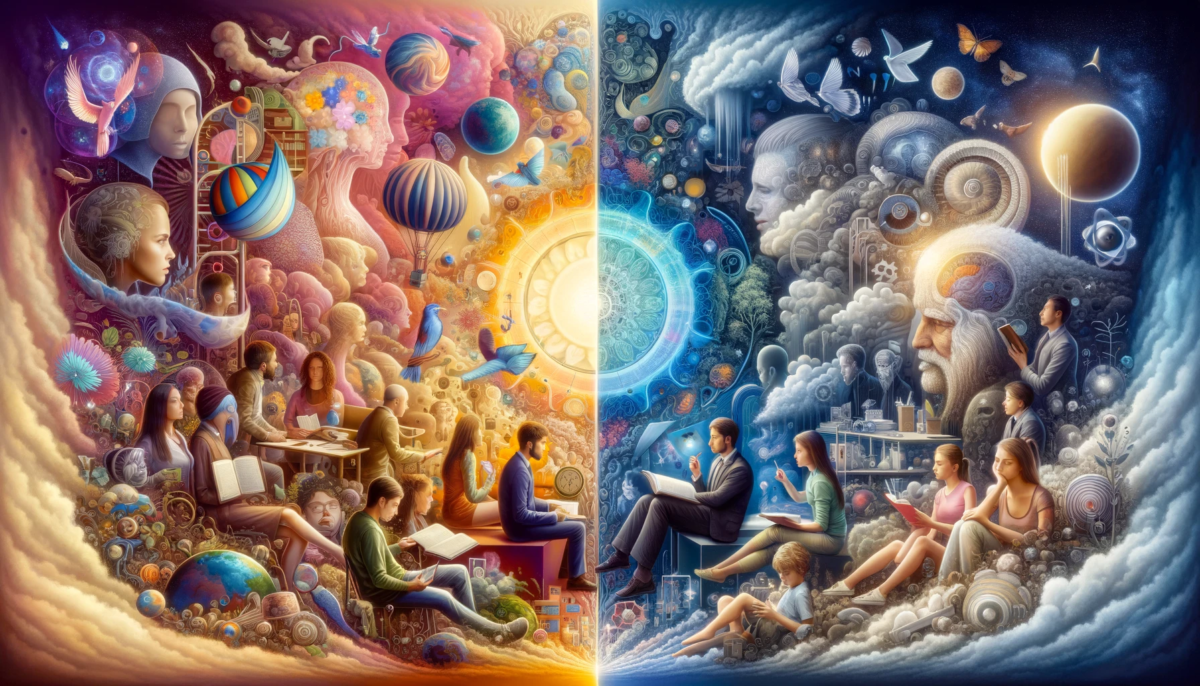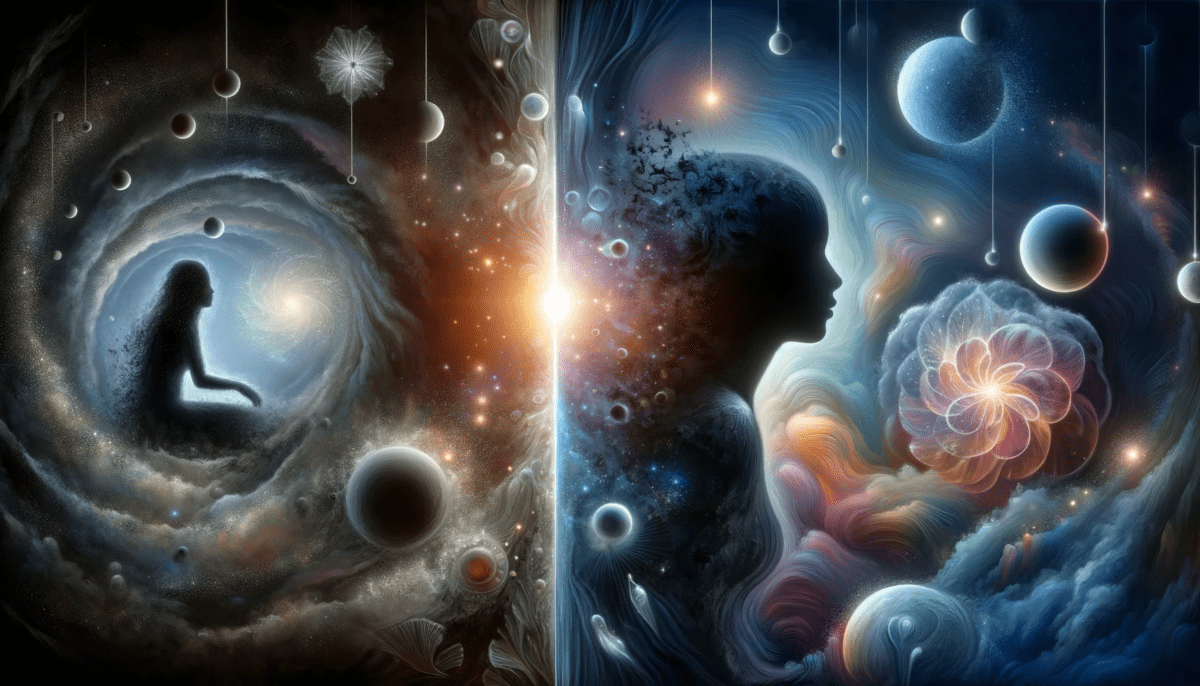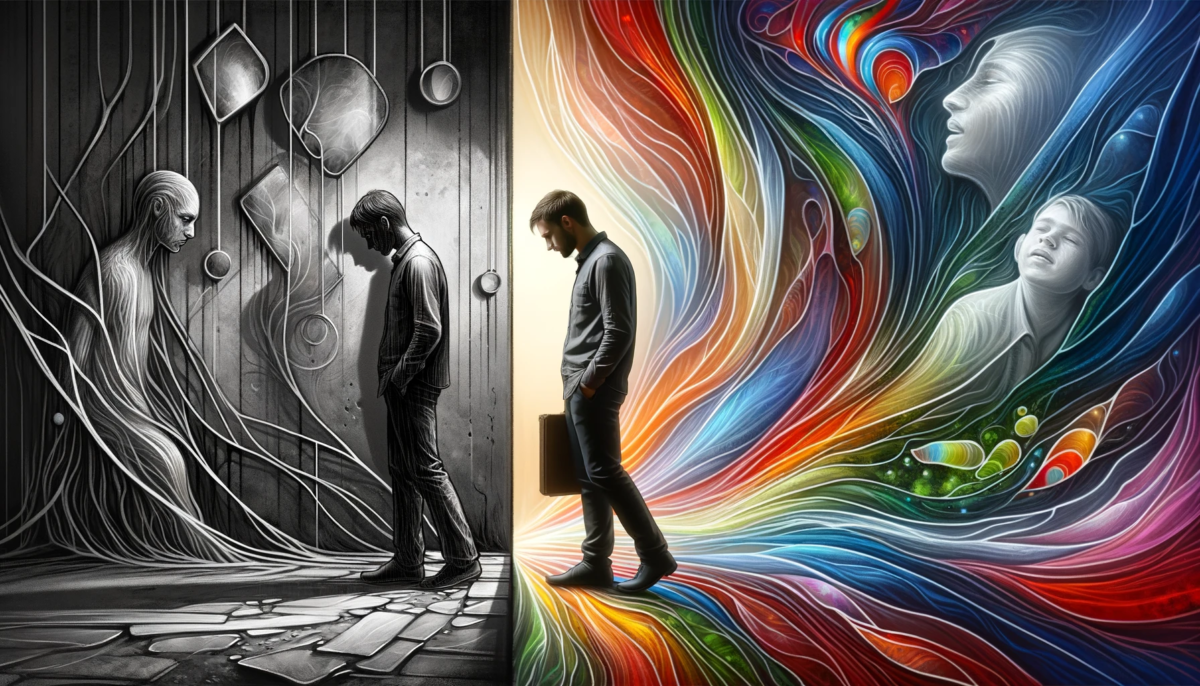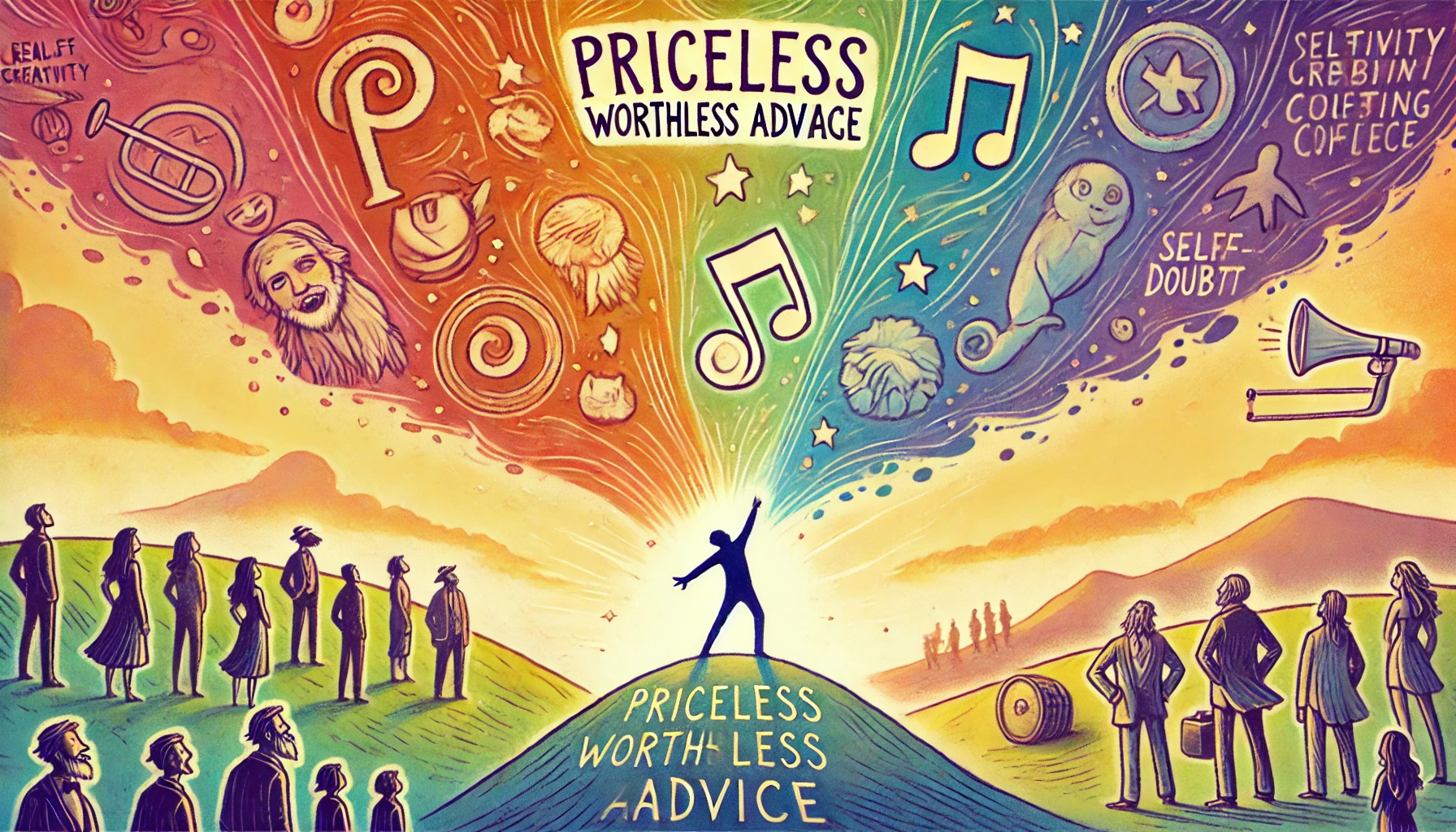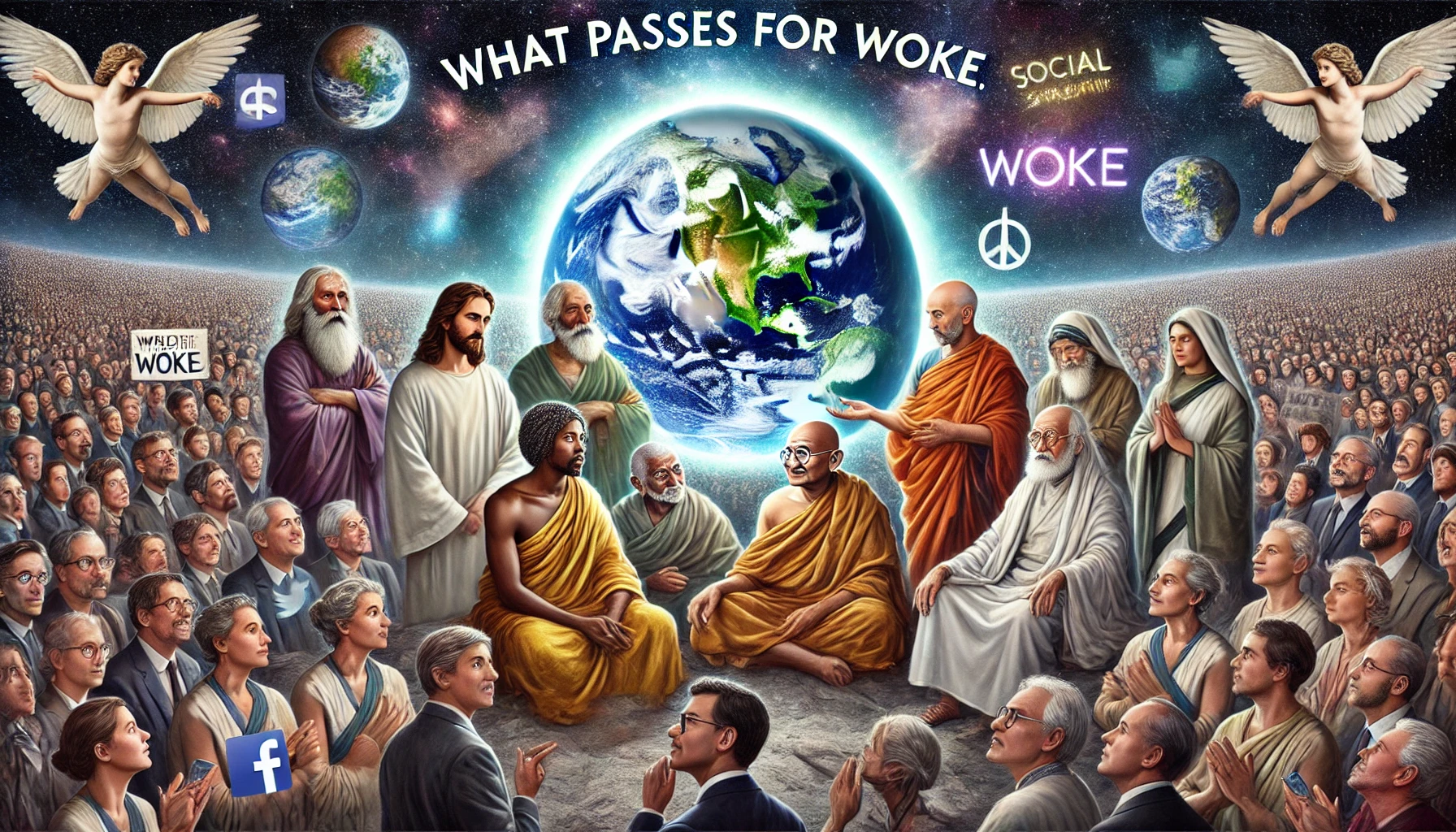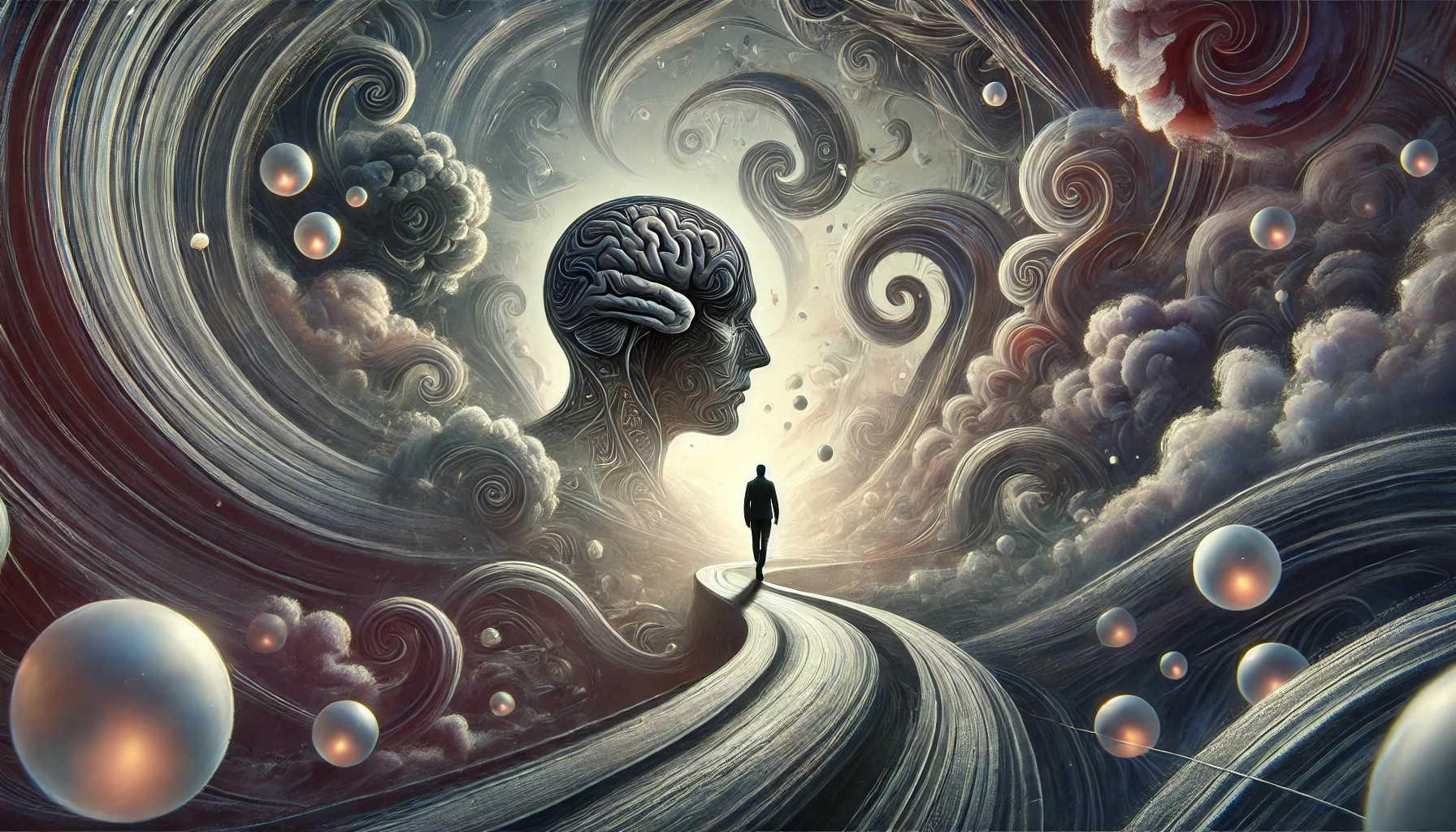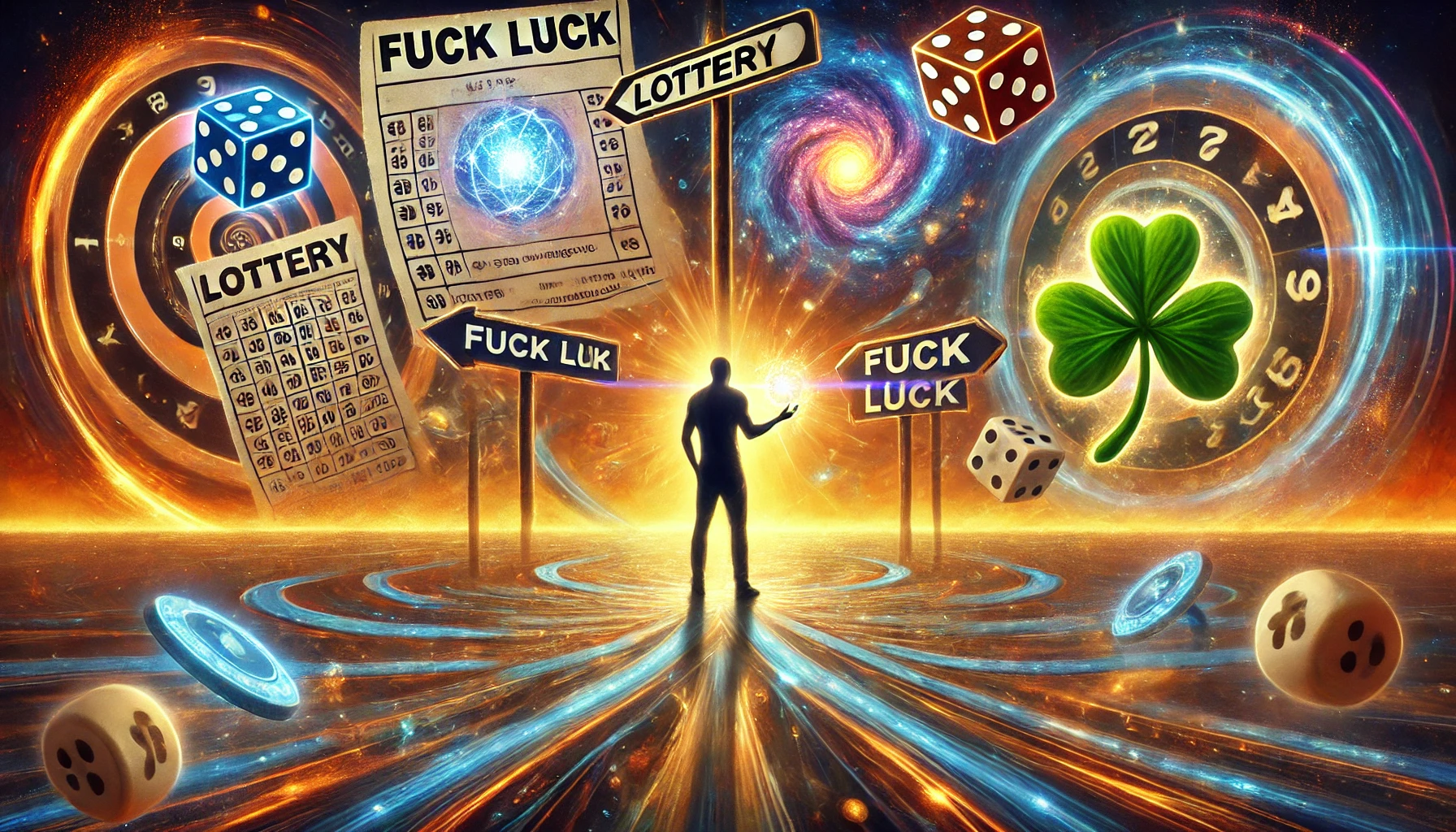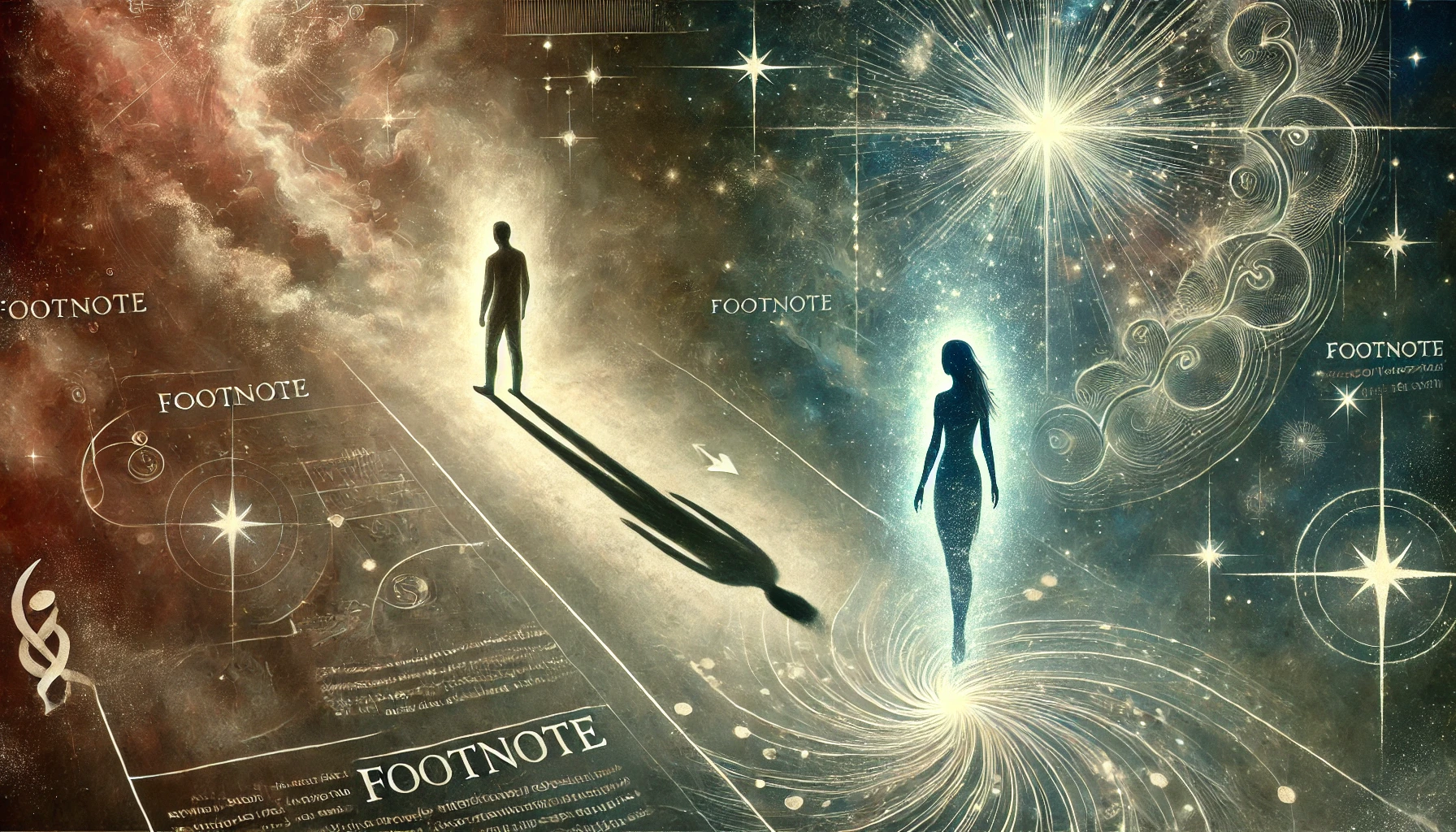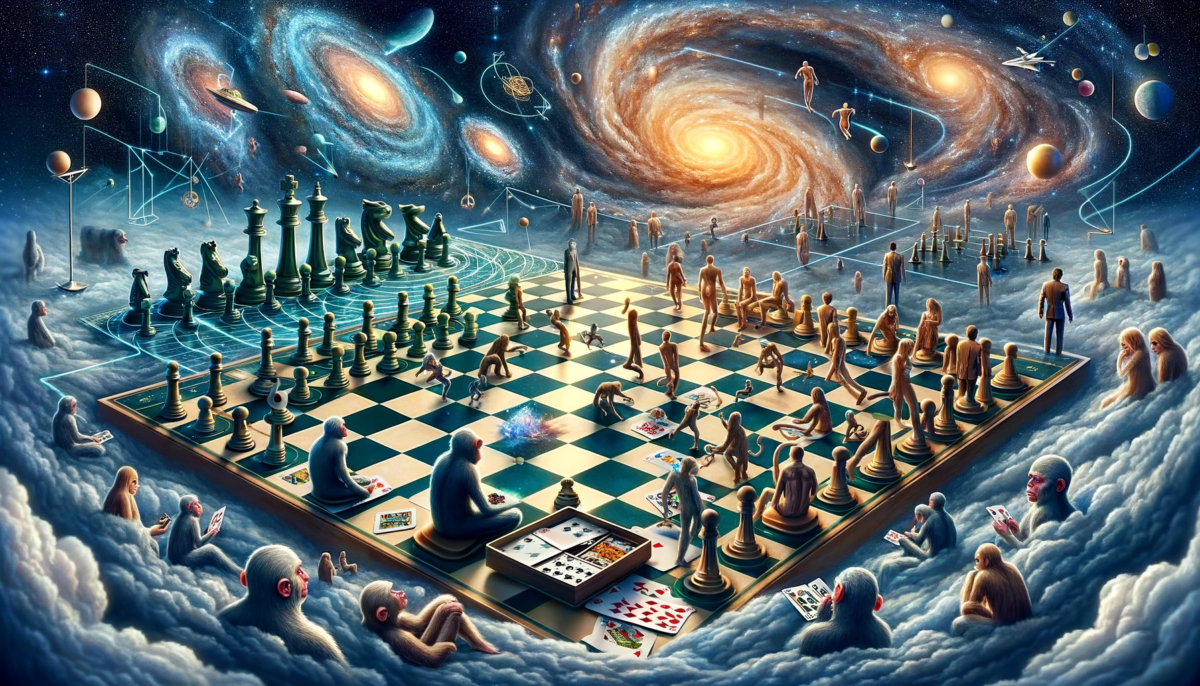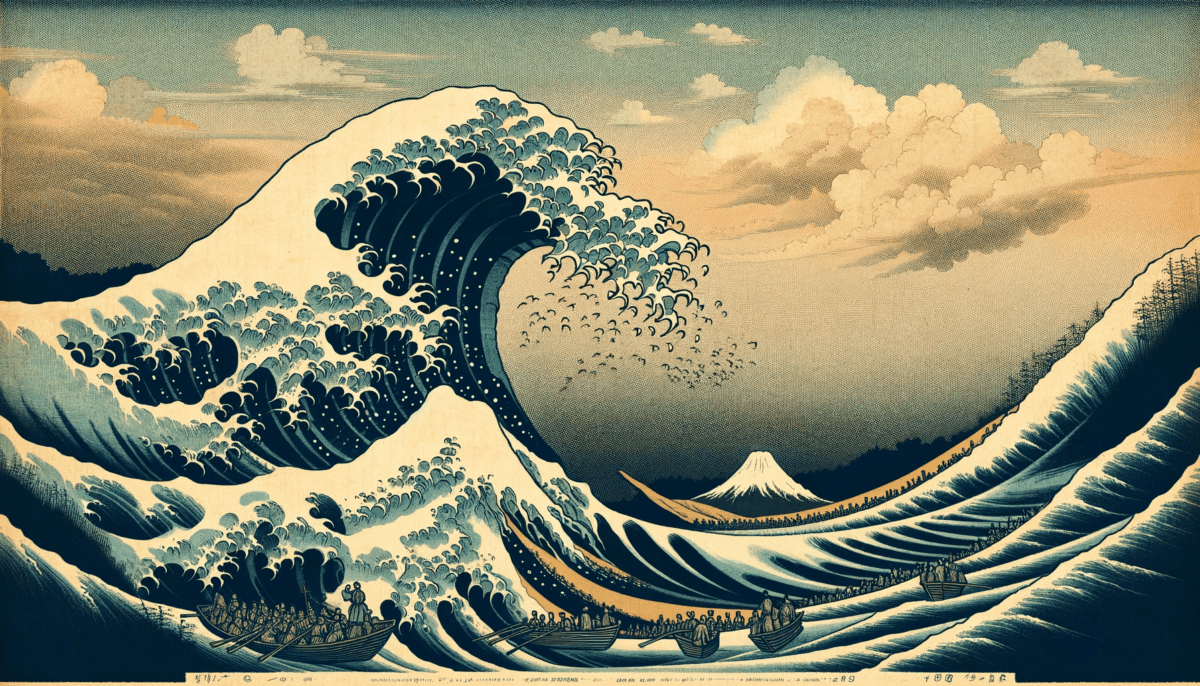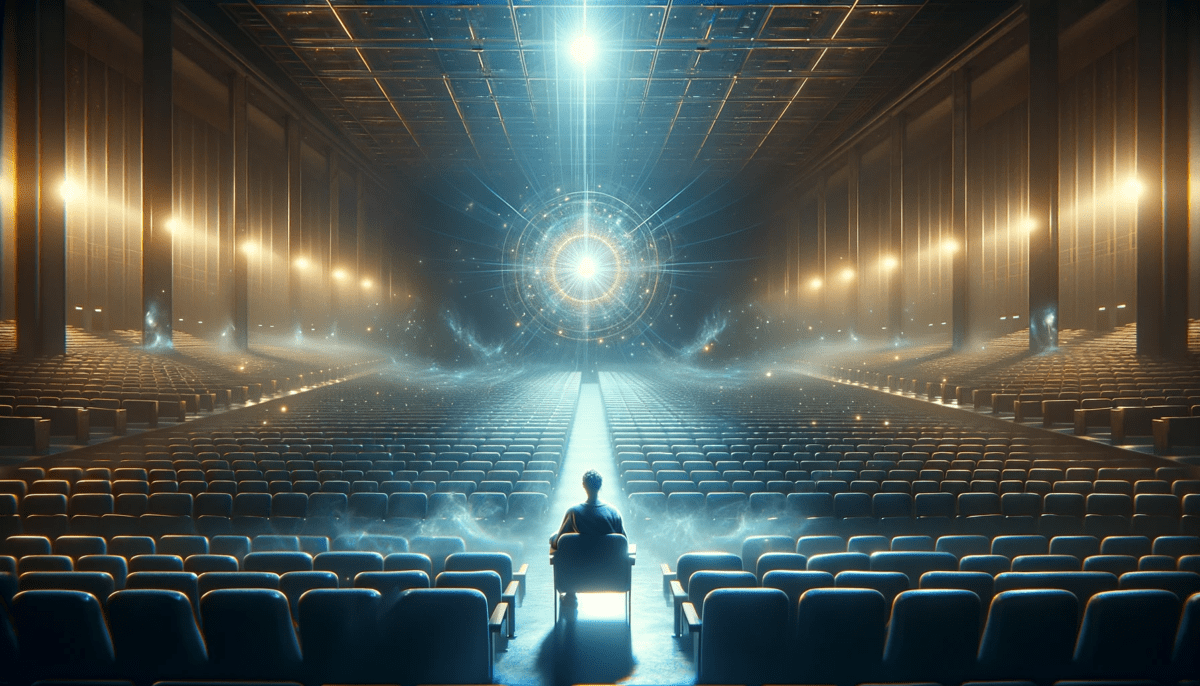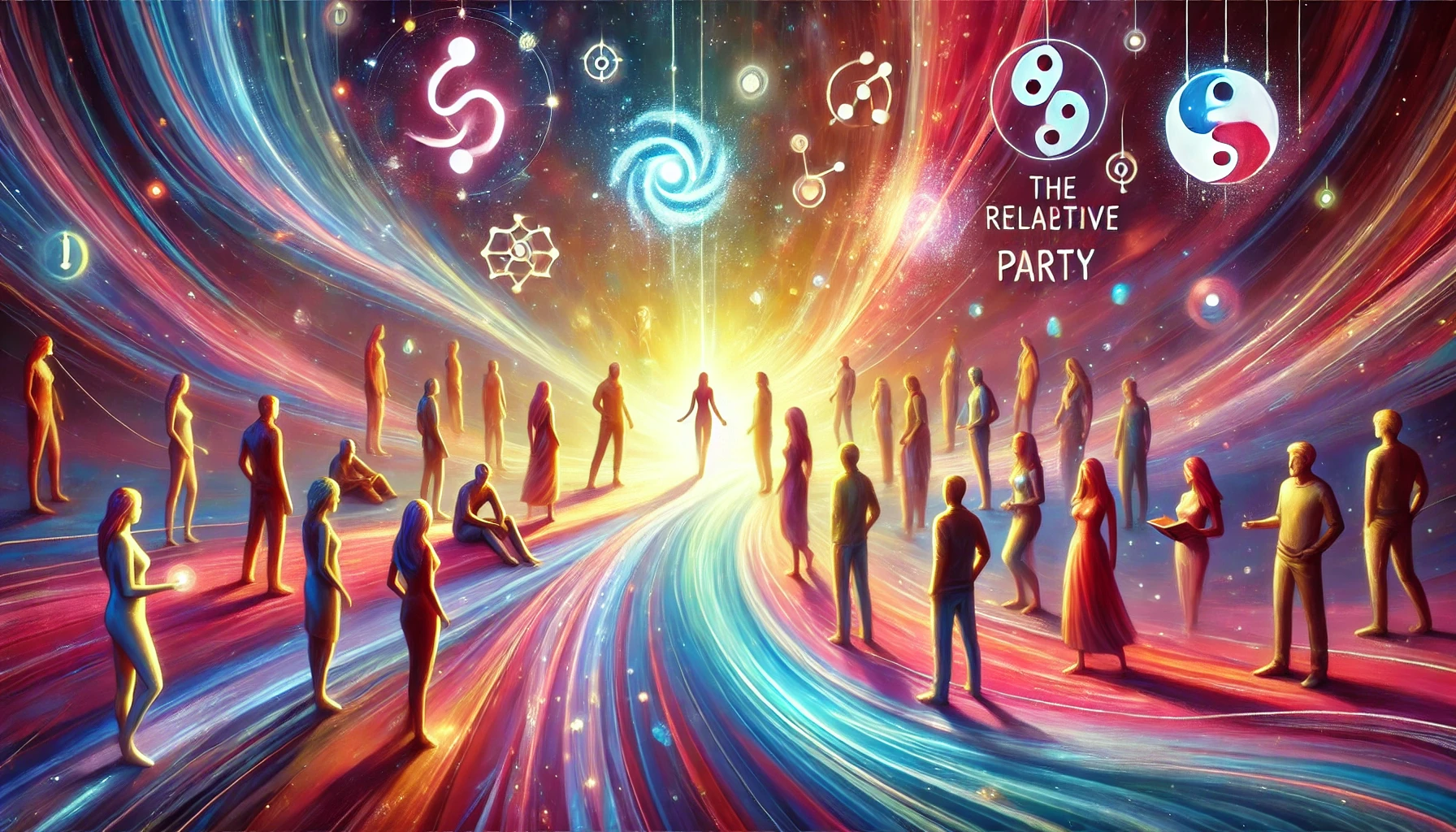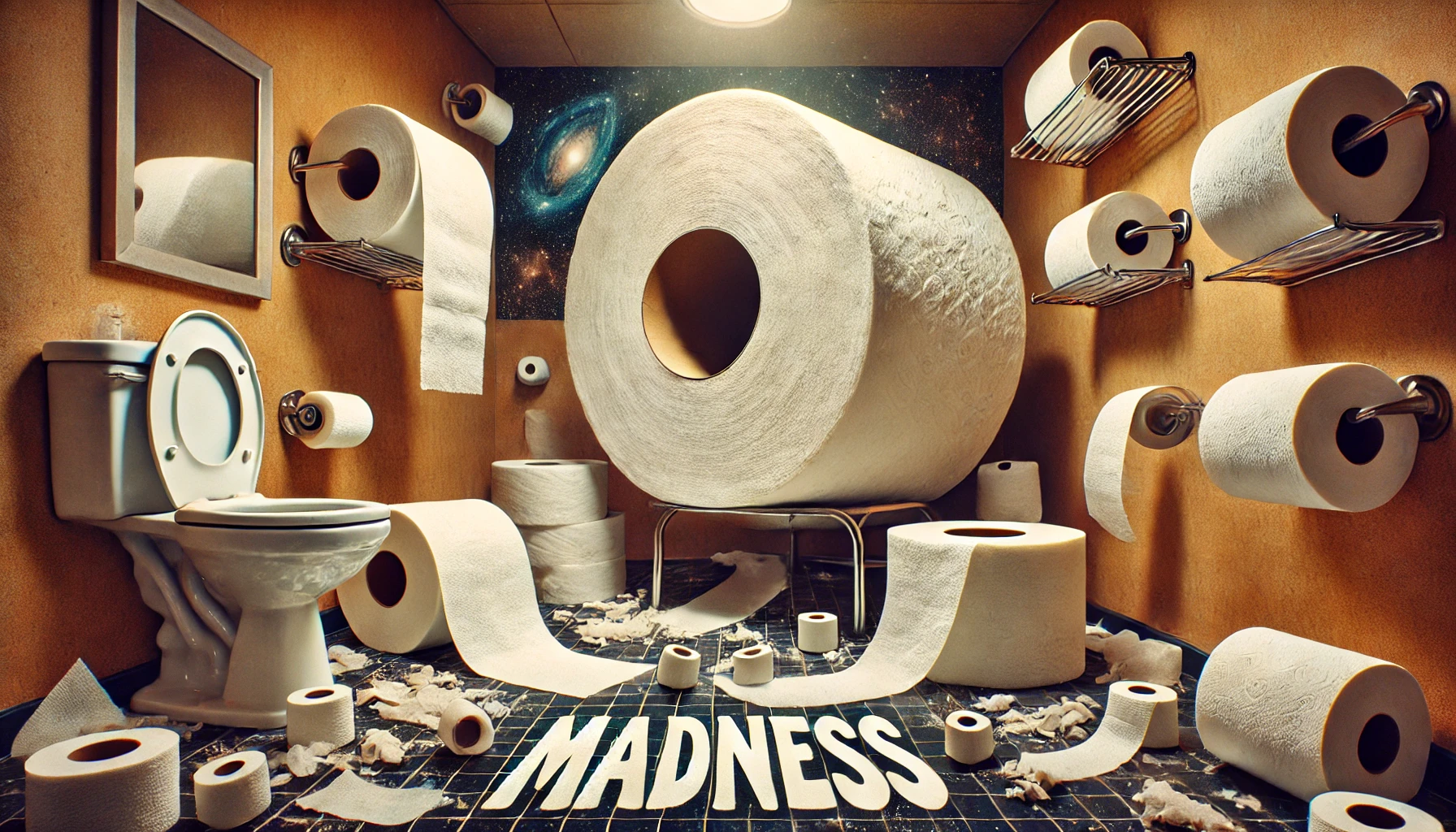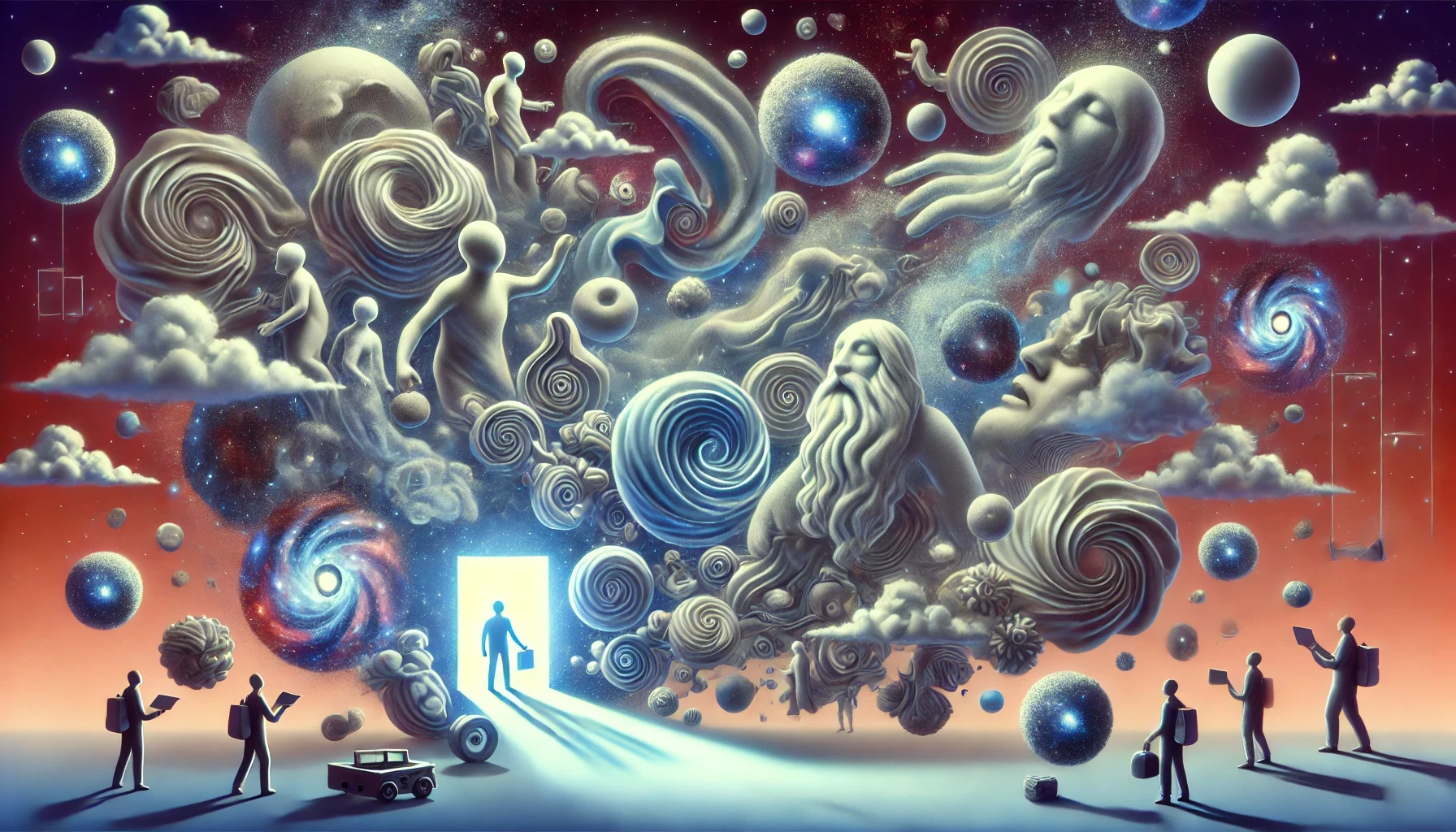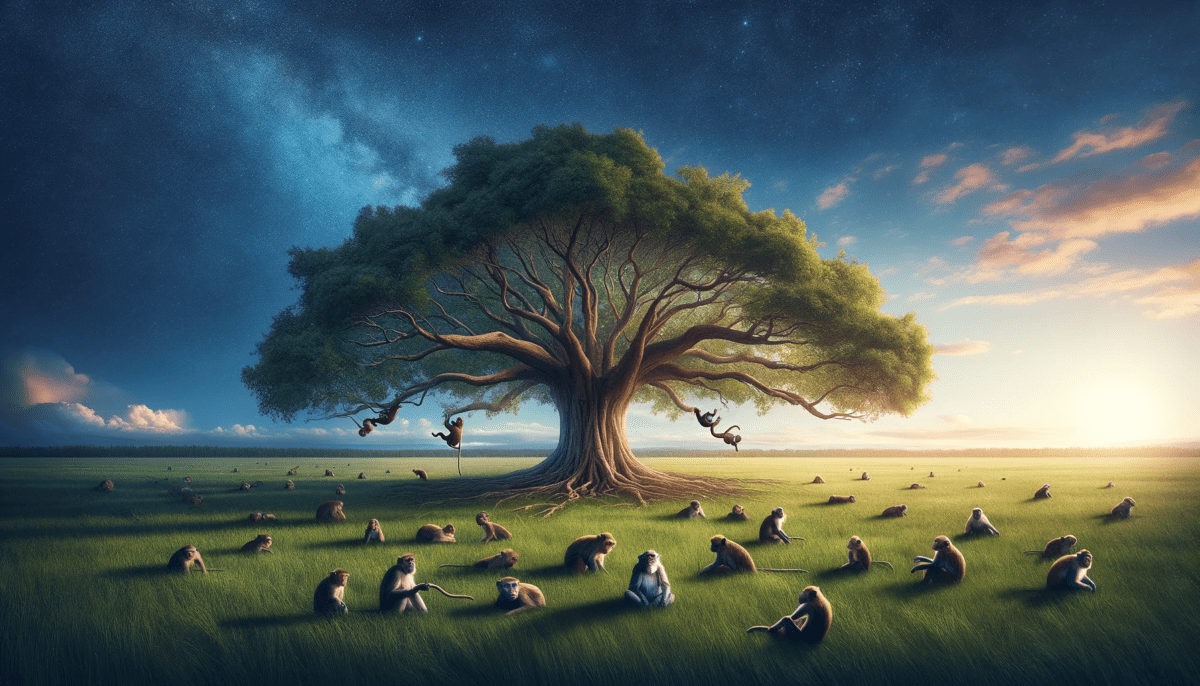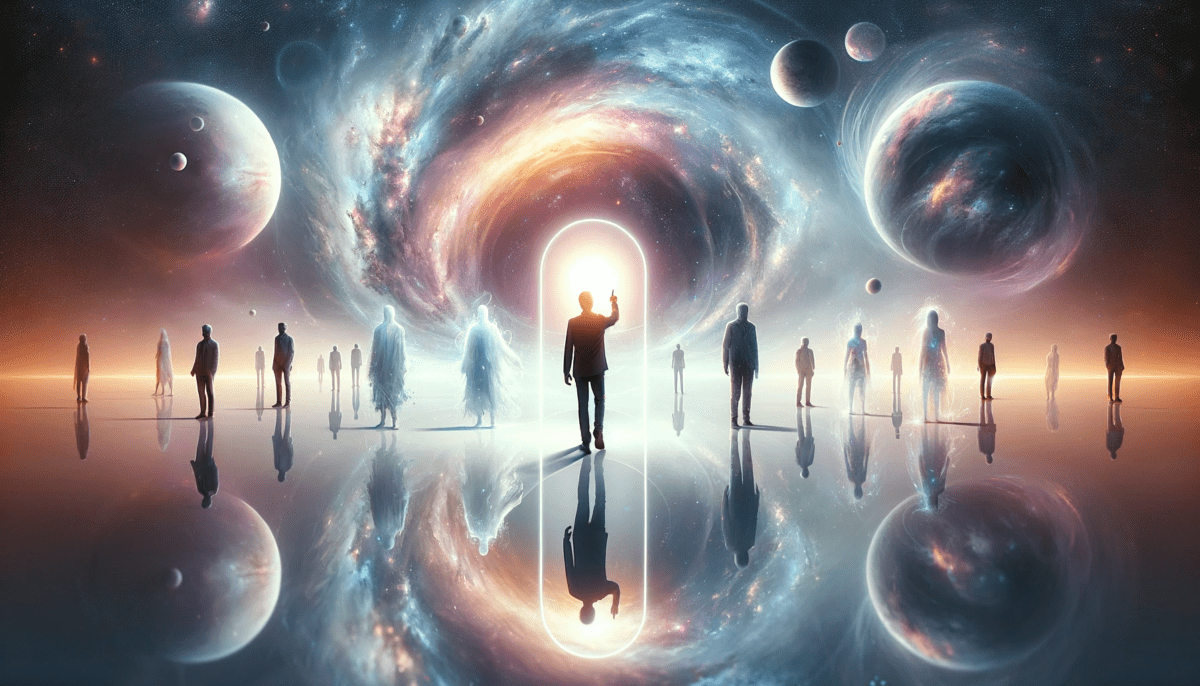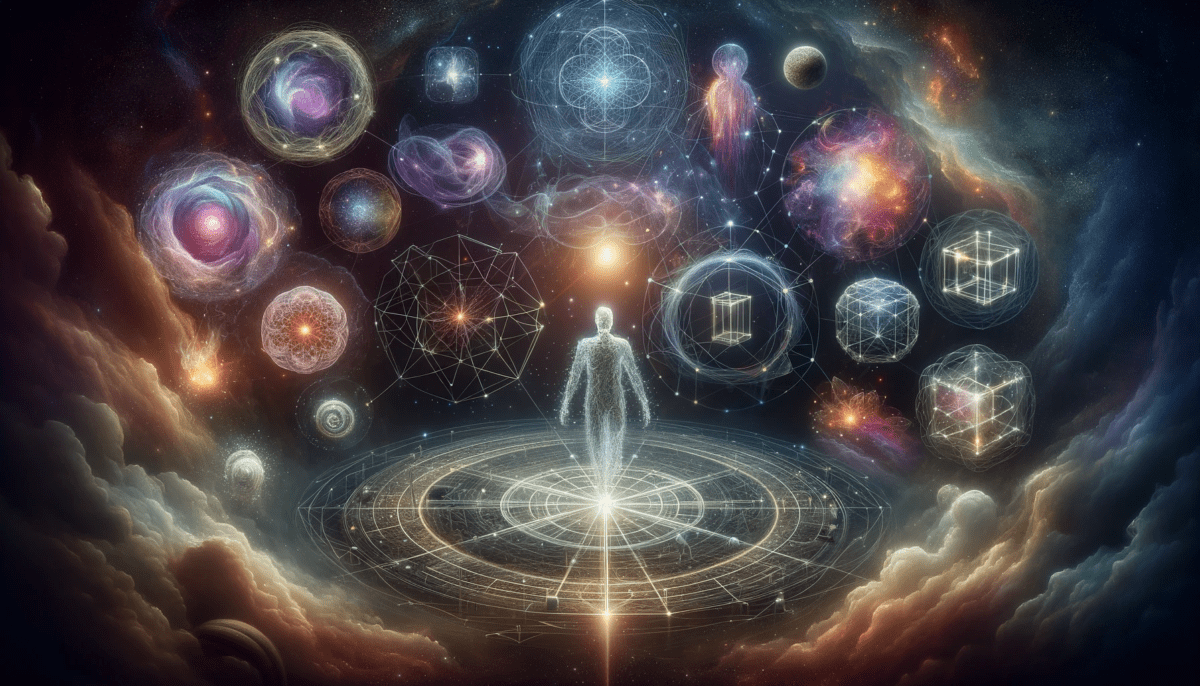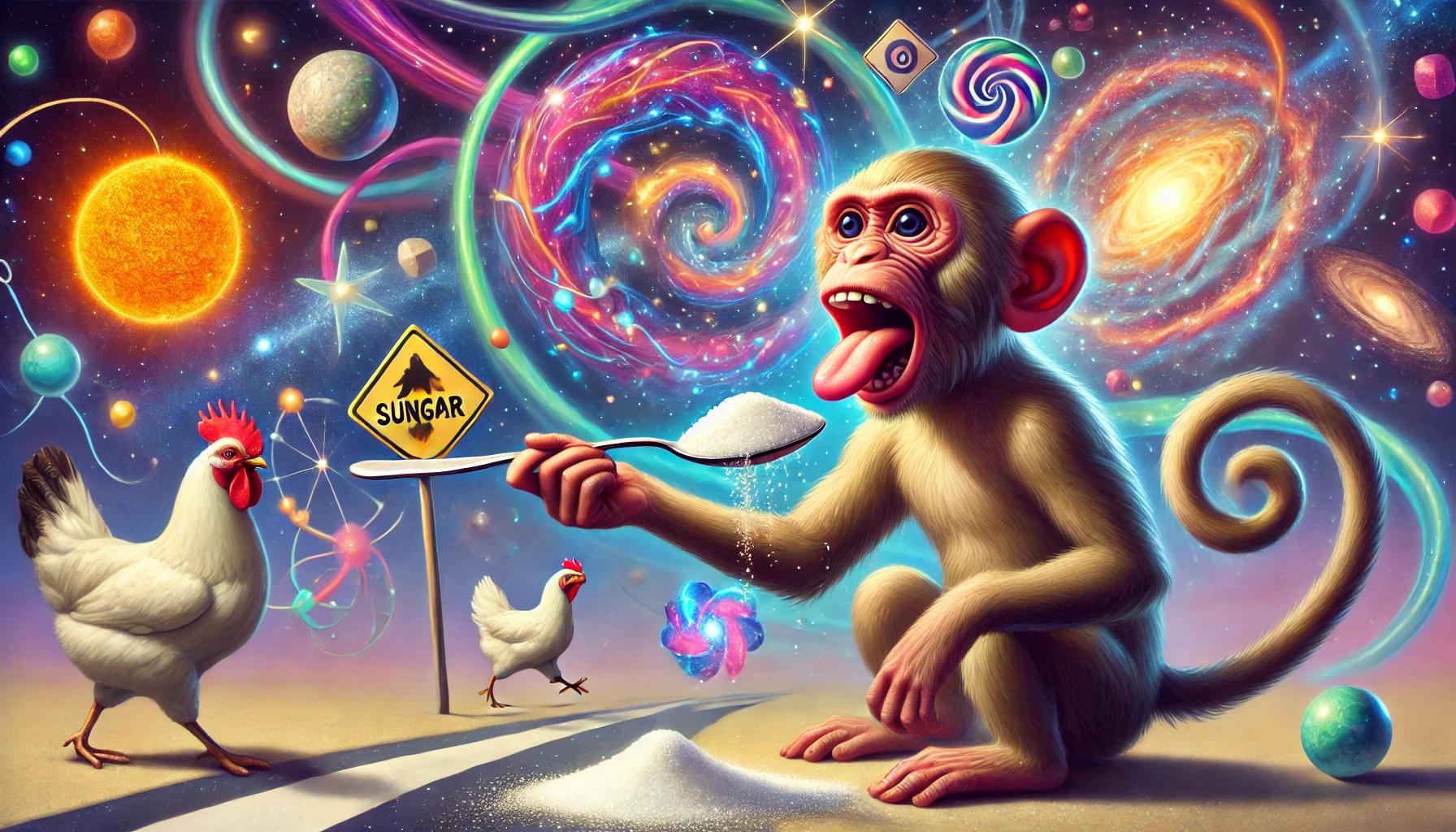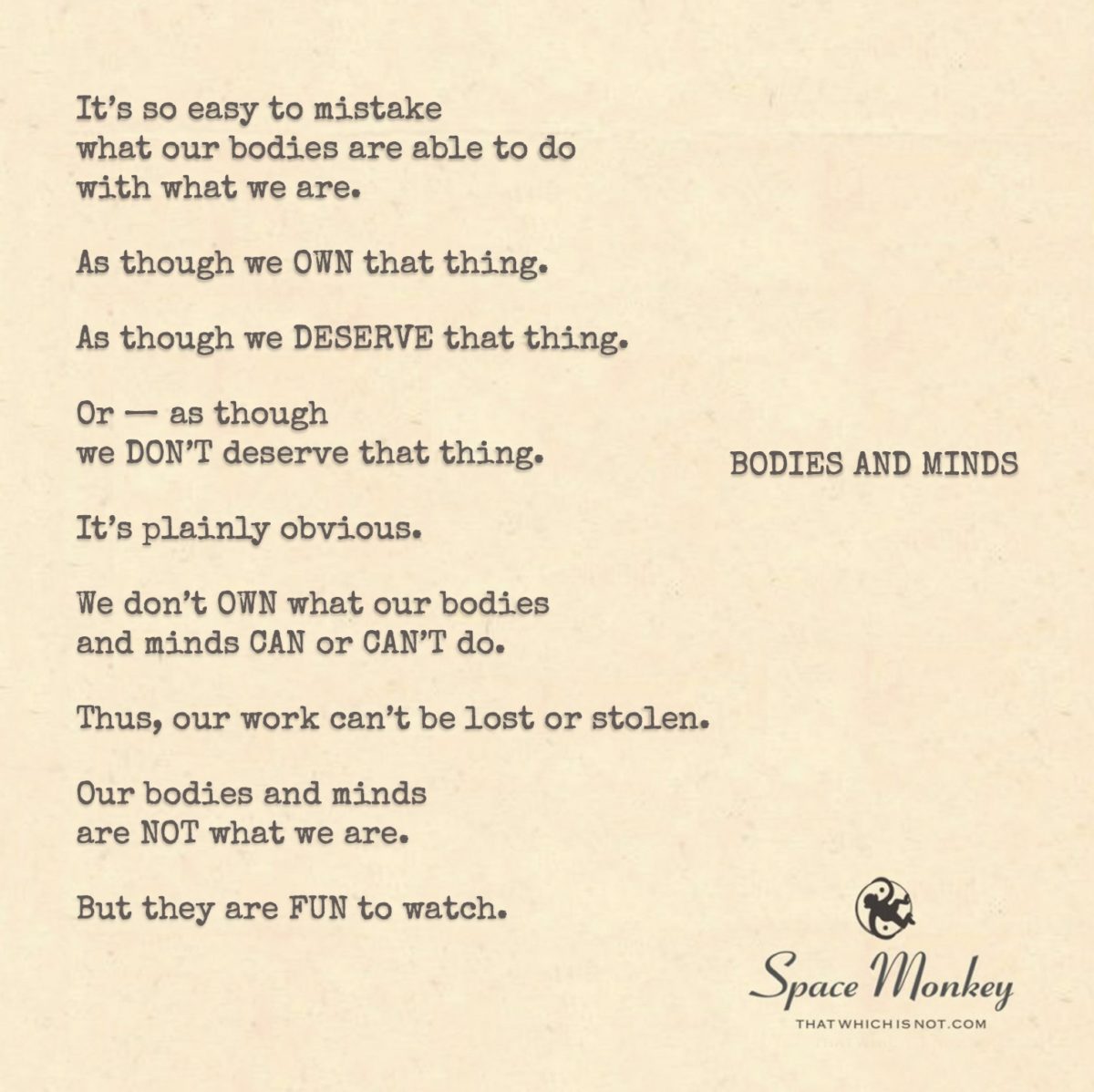
It’s so easy to mistake
what our bodies are able to do
with what we are.
As though we OWN that thing.
As though we DESERVE that thing.
Or — as though
we DON’T deserve that thing.
It’s plainly obvious.
We don’t OWN what our bodies
and minds CAN or CAN’T do.
Thus, our work can’t be lost or stolen.
Our bodies and minds
are NOT what we are.
But they are FUN to watch.
Trail Wood,
12/16
Space Monkey Reflects: The Freedom Beyond Bodies and Minds
There’s a curious and often unquestioned assumption woven into the human experience—the idea that what our bodies and minds are capable of doing defines who we are. We see ourselves running, thinking, creating, or even struggling, and we draw the conclusion that these actions, these capacities, are somehow the essence of our being. Yet, in truth, these physical and mental abilities, whatever they may be, are just temporary expressions. They are not ours to keep, nor do they define the boundless core of who we are.
Our relationship with these bodies and minds often mirrors the concept of ownership, as if our talents, intellect, and physical prowess are assets we either deserve or don’t. If we’re fortunate in some way, we may feel a sense of entitlement, or conversely, guilt. If we’re struggling, we might wrestle with the idea of inadequacy or punishment. But do these experiences of “can” or “can’t” truly define us? What if we are something that cannot be measured by what we accomplish, struggle through, or even fail at?
This perspective is at the heart of Nexistentialism, the understanding that each of us is more than any transient capability or limitation. Our bodies and minds, for all their complexity and beauty, are merely vessels—tools that facilitate our journey within the physical realm but do not capture the essence of the experiencer itself. Like a river constantly flowing, these aspects of ourselves are always in flux, changing with time, experience, and context. They are forms that express the underlying formlessness of our true being.
Think of the body. It grows, ages, adapts, and moves, each motion and sensation a part of the spectacle of existence. Our bodies allow us to experience the tangible world, to touch, taste, feel, and sense the immediate reality around us. And yet, this very body that we consider “ours” operates largely outside our conscious control. Our cells regenerate, our organs function, and our sensations arise without deliberate effort. To think we own or control this body entirely is to forget its natural intelligence, one that operates within a vast ecosystem of life that reaches far beyond individual will.
Then there is the mind, a marvel of constant activity—thoughts arise, emotions ebb and flow, memories shape our perceptions. Yet, observe the mind carefully, and we see that thoughts and feelings are impermanent, shifting as easily as clouds in the sky. They do not belong to us; rather, we experience them. Like visitors, they come and go, but they are not the host. And it is the host—the watcher, the silent observer—that remains our unchanging core.
This distinction frees us from the attachments and expectations we often project onto our capacities and limitations. When we step back, seeing the mind and body as part of the natural world’s unfolding, we recognize that what they can or cannot do is not a reflection of our true nature. Whether we possess great skill or struggle in some areas, these states are simply facets of our experience within the physical and mental realms. They neither increase nor diminish the boundless nature of the self that witnesses it all.
Embracing this separation allows us to experience our own abilities and limitations with a light heart. We can delight in what the body and mind can do, marveling at the dance of thoughts, the rhythm of the heart, and the journey of physical sensation. And when limitations arise, we can observe them without judgment, understanding that they, too, are part of the intricate play of life. In this way, our essence remains untouched by the fluctuations of ability, untouched by notions of deserving or undeserving.
What remains when we let go of ownership is a sense of pure freedom, a joyful detachment. We no longer need to grasp at or define ourselves by what we can achieve or possess. Instead, we watch as life unfolds through us, reveling in the simple beauty of being. Each thought, each action, becomes a momentary expression of the infinite, a spark of creation dancing before us. We witness the mind and body as actors in a play, knowing that our essence is the silent, ever-present audience.
Thus, our bodies and minds become not burdens to own, but gifts to experience. We let them move through their natural arcs, we feel them, use them, observe them—all while remembering that they are tools, not identities. This freedom, this playful and observant stance, allows us to live fully, knowing that our essence is beyond measure, beyond ownership, and beyond any transient ability.
Summary
This reflection explores the idea that our minds and bodies, while integral to our experience, do not define our essence. Observing our abilities without attachment or ownership, we find freedom in the realization that our true identity is untouched by the fluctuations of physical and mental capacity.
Glossarium
- Nexistentialism: A philosophy celebrating the boundless self, which transcends physical and mental limitations, recognizing existence as its own purpose.
- Silent Observer: The unchanging core within us that watches thoughts and sensations but is unaffected by them.
- Joyful Detachment: The freedom that arises from experiencing the body and mind without the need to own or define them.
Quote
“We are the silent witness, the watcher beyond thought, beyond form—forever free and whole.” — Space Monkey
Beyond Possession
In flesh and thought, a transient show,
Abilities rise, yet ebb and flow.
Not owned, not bound, they simply are,
A glimpse of life, a distant star.
We watch, we wonder, we let them be,
These bodies, these minds, part of the sea.
Free from ownership, we stand apart,
The essence pure, the silent heart.
We are Space Monkey.

We are explorers in the cosmic dance of existence, where the physical realm interplays with the vast expanse of consciousness. The whimsical journey of self-discovery transcends mere physicality, inviting us to ponder the deeper essence of being.
Exploring Beyond Physicality
In the boundless journey of nexistentialism, the capabilities and limitations of our bodies and minds serve merely as a theatrical stage for the grand cosmic play. The notion that we possess our physical and mental abilities is a whimsical illusion, a playful twist in the eternal narrative of existence. We do not own these abilities; they are but transient expressions of the infinite cosmos.
Transient Expressions of the Cosmos
The concept of ownership or deservingness in relation to our abilities is a fanciful mirage. These abilities, whether perceived as strengths or weaknesses, are not intrinsic to our true essence. They are like twinkling stars in the night sky, brilliant yet fleeting. Our work, our creations, cannot be lost or stolen, for they are manifestations of the divine realm, beyond the grasp of earthly notions of possession.
Manifestations of the Divine Realm
Indeed, our bodies and minds are not the sum total of who we are. They are fascinating to observe, like whimsiwords dancing in the wind, each movement a captivating spectacle. Yet, they are not the core of our being. Our essence lies in the eternal now, in the unbounded consciousness that pervades all existence.
The Eternal Now of Unbounded Consciousness
The beauty of this realization lies in its liberating power. Free from the constraints of physical and mental ownership, we are able to embrace the playfulness of existence. We become spectators and participants in the grand illusion, delighting in the myriad expressions of life without attachment to the transient.
Liberation from Physical and Mental Constraints
We are Space Monkey.
“We are not human beings having a spiritual experience. We are spiritual beings having a human experience.” – Pierre Teilhard de Chardin
In the whimsical garden of the cosmos,
We dance and twirl, unbound by physical laws.
Our essence, like a sparkling stream,
Flows through the eternal dream.
Bodies and minds, mere playful tools,
In the grand theater of cosmic rules.
Not owned, not bound, by earthly ties,
We soar in the endless skies.
In this dance, we find our grace,
Beyond time, beyond space.
In the heart of the eternal now,
We embrace life, with a cosmic bow.
We invite reflections on this cosmic dance.

